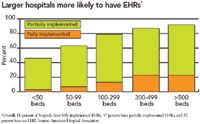Article
Update
Professional and financial news you can use
TAXES
Pace of e-filing picks up

Seniors, docs not talking enough about meds
A national survey of Medicare beneficiaries revealed that nearly one-third haven't talked about their different medications with their physicians within the past 12 months, either because they didn't initiate the discussion or their doctor didn't ask. The rate was 24 percent for patients who have three or more chronic conditions. Of those who didn't follow their drug regimen because of the cost of their medicines, 39 percent hadn't talked to their doctor about it. Another 27 percent of seniors skipped doses or stopped taking a drug altogether because of side effects or perceived nonefficacy without first consulting with their physician.
Overall, 41 percent of respondents reported taking five or more Rxs, and more than half say they have two or more physicians who prescribe medications for them. The results were published in the Journal of General Internal Medicine.
REIMBURSEMENT
Commission to Congress: Pay doctors for quality
Medicare should start paying more for high-quality care and less for care of poor quality, says the latest report to Congress from the Medicare Payment Advisory Commission. Future payment policies should reward providers for efficient use of resources and create incentives to increase quality and coordinate care, the Commission said. It called for Medicare to rely more on information technology, to compare providers' practice styles and use of resources, and thus reduce "unwarranted variation in volume and expenditures." The Commission recommended that such data be used to adjust payments to physicians.
HOSPITALS
Use of health IT is on the rise

FDA
Former commissioner to pay big fine
Lester M. Crawford, who resigned abruptly as FDA commissioner in September 2005 after just two months on the job, was recently given three years of supervised probation and ordered to pay fines totaling about $90,000. The sentence followed Crawford's guilty plea last October to charges of misleading federal officials with regard to stocks he owned in FDA-regulated companies while serving as commissioner. Specifically, he knowingly made false statements on financial disclosure forms and violated conflict-of-interest laws. Crawford was also given 50 hours of community service.





